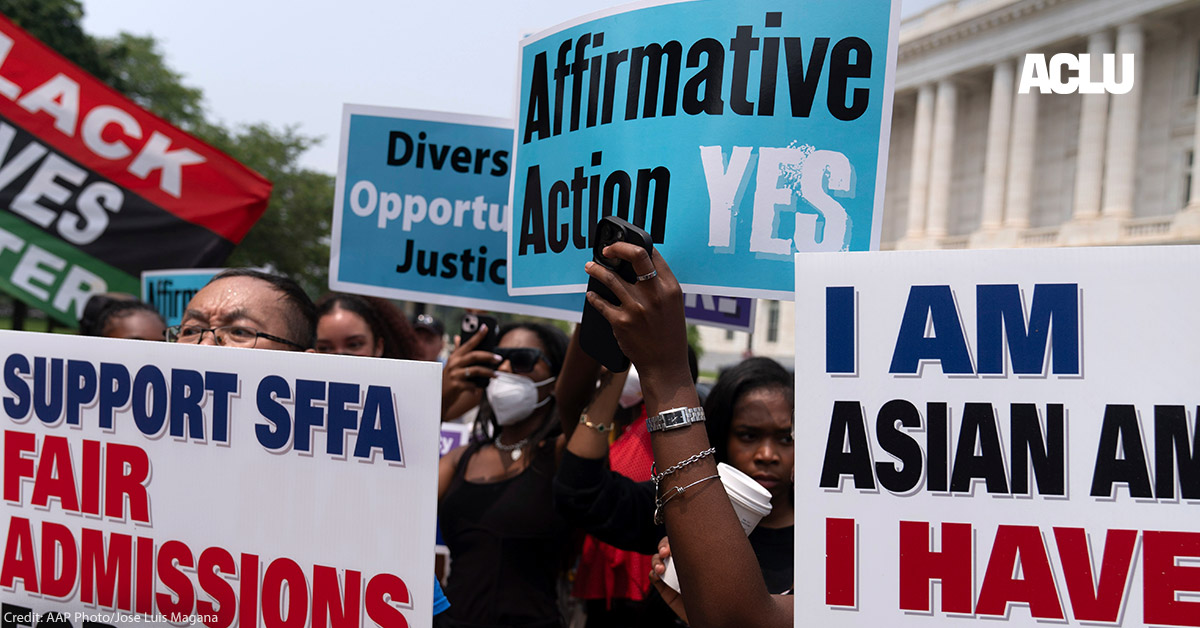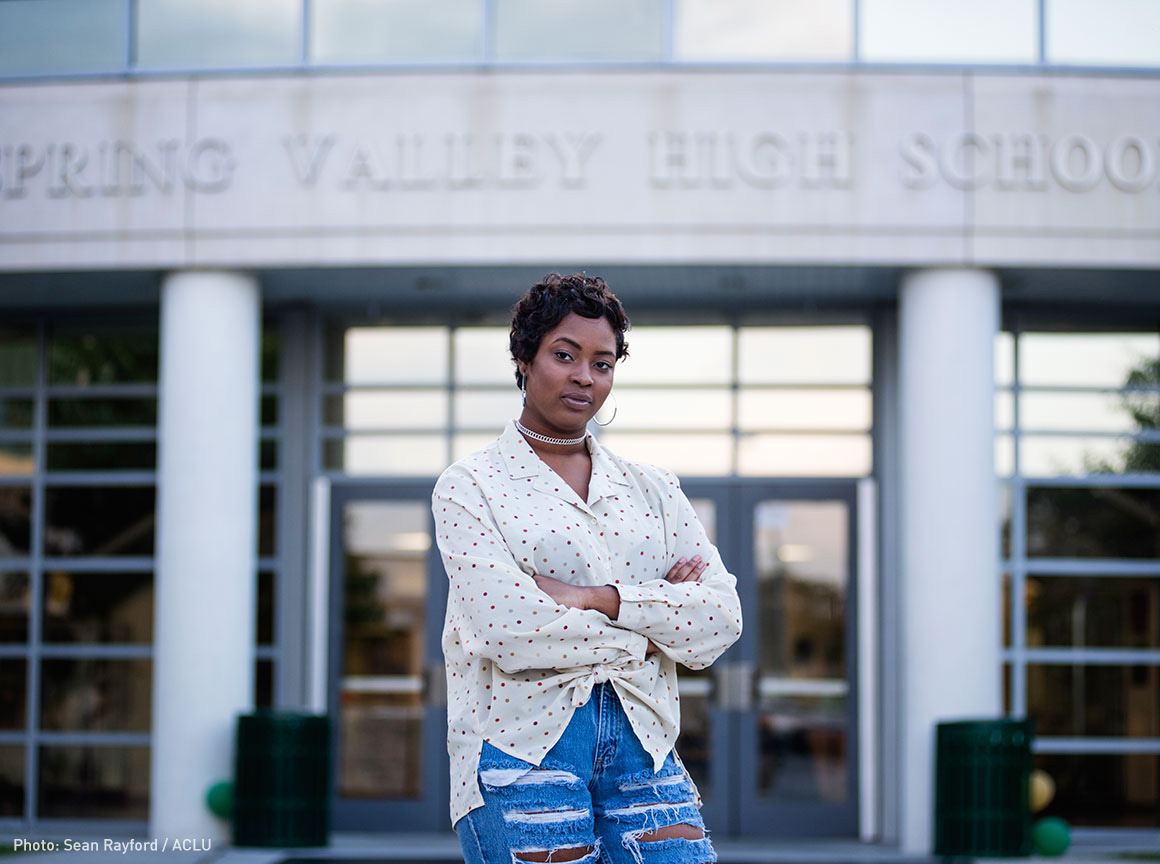All college students have a proper to an equal schooling, however college students of colour — significantly Black and Brown college students and college students with disabilities, have traditionally been marginalized and criminalized by the general public faculty system. The ACLU has been working to problem unconstitutional disciplinary insurance policies in colleges, fight classroom censorship efforts that disproportionately influence marginalized college students, and help race aware admission insurance policies to extend entry to greater schooling.
Let’s break down why schooling fairness is important to the combat for systemic equality.
What does “schooling fairness” imply, and why is it a civil rights challenge?
Schooling fairness means all college students have equal entry to a top quality schooling, protected studying surroundings, and a various scholar physique that enriches the academic experiences of all college students.
Because the Supreme Courtroom mentioned in Brown v. Board of Schooling, schooling “is the very basis of fine citizenship.” By means of schooling, younger folks study vital values about our tradition and democratic society, and about their very own values and relationships to others on this society. Along with being an vital basis for teenagers’ and younger adults’ future skilled success, schooling permits people to be told voters and contributors in democratic processes, and public schooling is the primary expertise most individuals could have with the federal government.
For all of those causes, fairness in schooling is a important basis for a democratic society wherein folks of all backgrounds are equally included. The ultimate alternatives to acquire an schooling, they will be unable to take part equally in jobs, in voting, and in different essential areas of life. And when college students aren’t in a position to study collectively, this harms their capability to work collectively and reside and interact with each other later in life.
What was the foundational Supreme Courtroom case geared toward addressing discrimination in schooling nationwide?
Trendy understandings of instructional fairness have their roots in Brown v. Board of Schooling, the 1954 landmark Supreme Courtroom choice that ordered an finish to high school segregation and held racial segregation in schooling violates the Equal Safety Clause of the structure. The ACLU performed an vital position within the Brown litigation, and has continued to combat for schooling fairness on many fronts within the many years since.
What’s the “school-to-prison pipeline”?
The college-to-prison pipeline refers to high school self-discipline practices, equivalent to suspensions and referrals to regulation enforcement, that funnel youth out of the classroom and into the juvenile and felony authorized programs.
This development displays our nation’s prioritization of incarceration over schooling, and it’s made worse as assets for public colleges are reduce. From insufficient assets for counseling to an overreliance on school-based cops to implement harsh zero-tolerance insurance policies, many college students — overwhelmingly college students of colour and college students with disabilities — are remoted, punished, and pushed out of our schooling system for typical infantile conduct and behaviors related to disabilities.
Cops and No Counselors
How the dearth of faculty psychological well being workers is harming college students.
Supply: American Civil Liberties Union
Even a single suspension or disciplinary infraction can have huge penalties for a kid’s schooling. As a scholar is pushed additional down the school-to-prison pipeline, these penalties escalate rapidly. In some jurisdictions, college students who’ve been suspended or expelled haven’t any proper to an schooling in any respect. In others, they’re despatched to disciplinary different colleges.Youth who turn into concerned within the juvenile system are sometimes denied procedural protections within the courts, and college students pushed alongside the pipeline discover themselves in juvenile detention amenities, lots of which offer few, if any, instructional companies.
How are Black college students, college students of colour, and college students with disabilities disproportionately impacted by discrimination in schooling? What limitations to greater schooling exist for college students of colour?
Black and Brown college students and college students with disabilities are disproportionately subjected to self-discipline and referrals to regulation enforcement that take away them from the classroom and topic them to further punitive penalties and even bodily harm. For instance, over the 2017-2018 faculty yr, Black college students accounted for 28.7 p.c of all college students referred to regulation enforcement and 31.6 p.c of all college students arrested at college or throughout a school-related exercise — regardless of representing simply 15.1 p.c of the overall enrolled scholar inhabitants.
Our nation’s colleges are more and more numerous, but in addition more and more segregated. College students of all races are harmed by the lack to study with each other in numerous faculty settings. Black and Latine college students are additionally extra prone to attend colleges which are intensely segregated each by race and by socioeconomic standing. College students of colour are additionally much less prone to have entry to superior programs, and are continuously tracked away from faculty preparatory programs once they do exist.

Transferring Past the Supreme Courtroom’s Affirmative Motion Rulings
The work to make sure instructional alternatives for folks of colour continues, regardless of the court docket’s choice.
Supply: American Civil Liberties Union
Inequities in Okay-12 schooling might be replicated in faculty and college admissions standards. As with elementary and secondary colleges, schools and universities are required to make sure that instructional alternatives are open to all college students from the applying stage and thru scholar’s experiences throughout their faculty schooling. There are a variety of issues that faculties and universities can do to make sure that instructional alternatives are open to folks of all backgrounds.
What non-punitive responses ought to colleges take when approaching faculty self-discipline points? What non-punitive assets ought to colleges put money into?
There are a selection of evidence-based strategies colleges can use to reply to the behavioral wants of scholars. These vary from methods that academics and colleges can use to foster a constructive studying tradition and mannequin, to interventions addressing specific disciplinary points, equivalent to battle de-escalation or restorative justice, to utilizing purposeful behavioral assessments and wraparound help for these college students with greater ranges of want.
Moreover, colleges that employed extra psychological well being suppliers noticed improved scholar engagement and commencement charges. Faculties that used different forms of help, together with restorative and trauma-informed practices, noticed helpful outcomes, together with decreased disciplinary incidents, suspensions, dropouts, and expulsions. Investing in psychological well being assets, help personnel, and interventions that promote constructive scholar interactions could make colleges safer and more healthy studying environments, whereas additionally serving to to fight the discriminatory school-to-prison pipeline that targets college students of colour and college students with disabilities.
How do classroom censorship efforts (i.e. legal guidelines that block college students and academics from speaking and studying about race and gender) result in inequality in schooling?
Instruction about racism and sexism belongs in colleges as a result of it equips college students to course of the world round them and to reside in a multicultural society.
Assaults on schooling have morphed from calls for to exclude important race concept from school rooms to ever-increasingly devious and harmful calls for to erase complete ideas from American historical past. Ebook bans, so-called transparency legal guidelines designed to intimidate educators into compliance, and assaults on particular person expression have left our schooling system on the mercy of a hostile and discriminatory minority. College students can’t study in that sort of surroundings. Our future relies on instructional establishments that worth instruction about systemic racism and sexism. We have to develop culturally related instruction and improve funding for range, fairness, and inclusion in colleges, not assault it for its position in uplifting the systematically oppressed.
What can schools do to make sure they create alternatives for college students of colour in mild of the current Supreme Courtroom choice successfully eliminating the usage of affirmative motion in faculty admissions?
Affirmative motion in faculty admissions has been an vital software, however it’s not the one avenue for making certain that instructional alternatives are open to all. Within the absence of affirmative motion, it’s extra vital than ever that colleges work to determine and take away inequitable limitations to greater schooling. At a minimal, colleges should proceed to adjust to federal and state civil rights legal guidelines that require them to supply instructional alternatives on an equal foundation. They’ll obtain this by making certain that insurance policies and practices don’t unnecessarily restrict alternatives for folks on the premise of race or ethnicity (or different protected traits, together with incapacity, intercourse, sexual orientation, and gender identification) and by making certain that college local weather allows all college students to entry and interact with instructional alternatives.
What does the ACLU’s work in schooling fairness appear like immediately?
The ACLU and our associates across the nation are difficult disciplinary insurance policies that disparately goal college students of colour and college students with disabilities and infringe on their proper to a protected studying surroundings. This consists of litigation, equivalent to our current victory ensuing in the long run to charging college students with “disorderly conduct” or “disturbing colleges” in South Carolina colleges, and advocacy, such because the ACLU of Idaho’s current report Proud to be Brown and the associated civil rights criticism. The report paperwork how faculty districts in Idaho are jeopardizing Latine college students’ civil rights and liberties by imposing “gang” gown codes that focus on principally Latine college students in a discriminatory manner, and have unfavourable penalties on their cultural identification, self-discipline, and schooling.

CYAP v. Wilson
The ACLU Union filed a federal lawsuit difficult South Carolina’s “disturbing colleges” regulation.
Supply: American Civil Liberties Union
We’re additionally preventing again towards efforts to ban books and prohibit what college students can study race, gender, and sexual orientation. In Florida, for instance, we’re difficult the state’s dangerous Cease WOKE Act. We proceed to press for fairness in greater schooling following the Supreme Courtroom’s ruling on affirmative motion, and defend towards assaults on range in Okay-12 colleges.
From Okay-12 to greater schooling, the ACLU is working to fight discrimination in schooling and guarantee all folks have equal entry to protected, high quality schooling.






























































